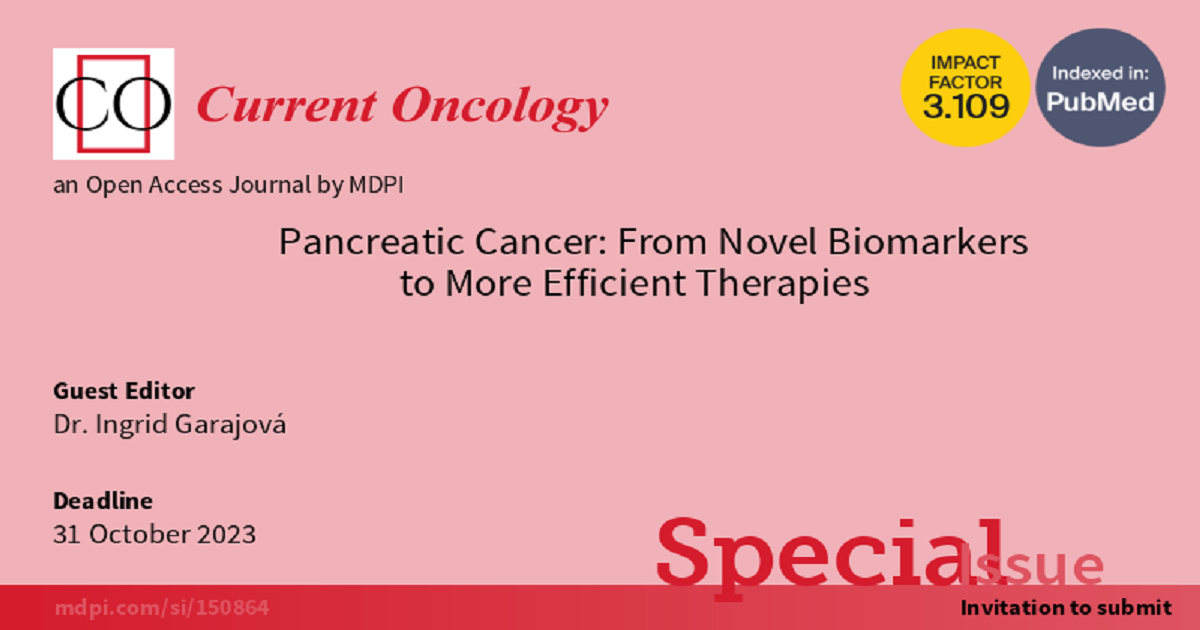Pancreatic Cancer: From Novel Biomarkers to More Efficient Therapies
A special issue of Current Oncology (ISSN 1718-7729).
Deadline for manuscript submissions: closed (31 October 2023) | Viewed by 7213

Special Issue Editor
Interests: pancreatic cancer; perineural invasion; pain; NGF; neutrophins
Special Issues, Collections and Topics in MDPI journals
Special Issue Information
Dear Colleagues,
Pancreatic ductal adenocarcinoma (PDAC) remains one of the most difficult tumors to treat. Radical surgery is the only potentially curative treatment, though, even in the group of radically resected patients, the five-year survival rate is below 25%. There are several reasons for the dismal prognosis of PDAC, in particular the late onset of symptoms, the biological aggressiveness characterized by early metastasis and the impressive resistance to many anticancer agents.
Unfortunately, progress in the management of both resectable and borderline resectable PDAC, but especially of locally advanced/metastatic disease, has been very modest in recent decades. In fact, chemotherapy regimens (gemcitabine and abraxane or FOLFIRINOX) are the gold standard in the treatment of locally advanced or metastatic PDAC, despite providing only slight improvements in overall survival, reaching at best a few months. No target therapies and no immunotherapy approaches are nowadays clearly effective against PDAC, and no predictive biomarkers of treatment effectiveness are used routinely in clinical practice. Only the implementation of genetic testing can change a very narrow treatment landscape for small subsets of patients with actionable aberrations. In particular, in BRCA1/2 mutated setting, olaparib (PARP inhibitor) might be proposed as a maintenance strategy. Therefore, novel therapies and biomarkers are needed in order to predict effectiveness/resistance to treatments.
In this Special Issue, original research articles and reviews are welcome. Research areas may include (but are not limited to) the following:
- predictive and prognostic biomarkers in PDAC
- translational research with the potential to increase the efficacy of actual treatments
- neoadjuvant therapy in resectable/borderline resectable PDAC
- adjuvant therapy in PDAC
- metastatic treatment possibilities in PDAC
We look forward to receiving your contributions.
Dr. Ingrid Garajová
Guest Editor
Manuscript Submission Information
Manuscripts should be submitted online at www.mdpi.com by registering and logging in to this website. Once you are registered, click here to go to the submission form. Manuscripts can be submitted until the deadline. All submissions that pass pre-check are peer-reviewed. Accepted papers will be published continuously in the journal (as soon as accepted) and will be listed together on the special issue website. Research articles, review articles as well as short communications are invited. For planned papers, a title and short abstract (about 250 words) can be sent to the Editorial Office for assessment.
Submitted manuscripts should not have been published previously, nor be under consideration for publication elsewhere (except conference proceedings papers). All manuscripts are thoroughly refereed through a single-blind peer-review process. A guide for authors and other relevant information for submission of manuscripts is available on the Instructions for Authors page. Current Oncology is an international peer-reviewed open access monthly journal published by MDPI.
Please visit the Instructions for Authors page before submitting a manuscript. The Article Processing Charge (APC) for publication in this open access journal is 2200 CHF (Swiss Francs). Submitted papers should be well formatted and use good English. Authors may use MDPI's English editing service prior to publication or during author revisions.
Keywords
- pancreatic cancer
- biomarker
- neoadjuvant therapy
- target therapy
Benefits of Publishing in a Special Issue
- Ease of navigation: Grouping papers by topic helps scholars navigate broad scope journals more efficiently.
- Greater discoverability: Special Issues support the reach and impact of scientific research. Articles in Special Issues are more discoverable and cited more frequently.
- Expansion of research network: Special Issues facilitate connections among authors, fostering scientific collaborations.
- External promotion: Articles in Special Issues are often promoted through the journal's social media, increasing their visibility.
- Reprint: MDPI Books provides the opportunity to republish successful Special Issues in book format, both online and in print.
Further information on MDPI's Special Issue policies can be found here.






